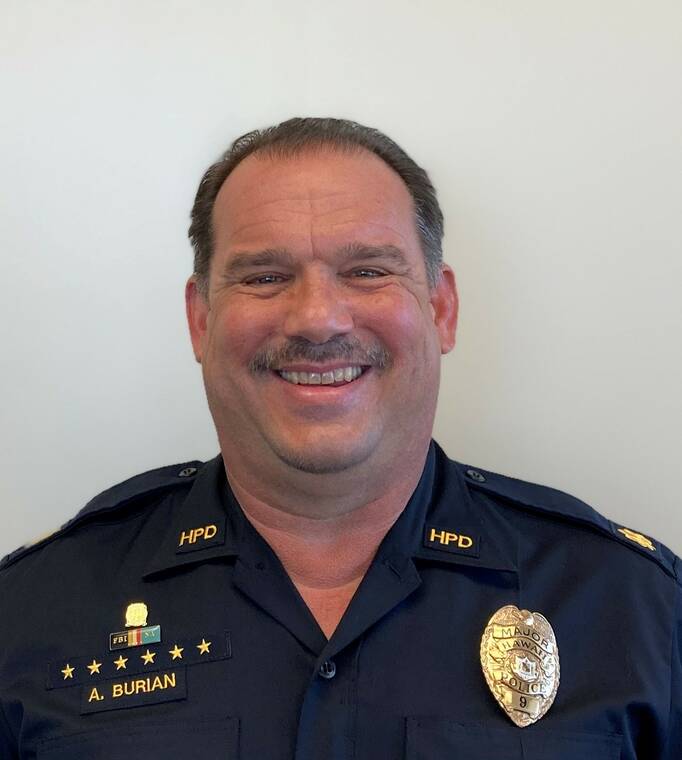Almost 4 of 5 fire dispatch recruits wash out
In the five-year period between 2018 and 2022, almost 80% — 14 of 18 — of the Hawaii Fire Department’s new dispatcher hires washed out, according to statistics provided by HFD.
In the five-year period between 2018 and 2022, almost 80% — 14 of 18 — of the Hawaii Fire Department’s new dispatcher hires washed out, according to statistics provided by HFD.
The Hawaii Police Department had a better success rate over that five-year period, but 59.5% of its new dispatcher hires — 25 of 48 — also left the department.
The severe shortage of fire and emergency medical services dispatchers caused the county to announce early last month that fire dispatchers, which also handles EMS calls, were moving from Hilo’s Central Fire Station to the Hilo Police Station’s dispatch center to consolidate services.
The county is recruiting both police and fire dispatchers. The pay is listed as $47,988 yearly with a $3,000 recruitment bonus, which is listed in on the Hawaii County jobs website as “conditional.”
“We have been able to maintain services — and a lot of this has been because of our remaining dispatchers working so hard and police dispatch helping us out,” said Fire Chief Kazuo Todd. “As chief, I take full responsibility for the failure in retaining our dispatchers.”
Todd cited a “mix of factors” for the department’s high washout rate for dispatchers.
“One of the issues has been the pay, which is up from where it used to be,” Todd said. “They were paying about $17 an hour, for which you could go work for Target. And Target would offer you close to or basically similar salary, but you didn’t have to do shift work — midnight to 8 a.m. — or rotate your sleep schedule on a monthly basis. The overtime did bring the salary up to a reasonable amount, but that loss of a social life in exchange for a living wage is not something that entices people to stay.
“Additionally … the job is very demanding. We ask for competent people, so we’re very strict on what expectations we have with people answering our 911 line, in terms of their quality and the ability to talk to people. And then on top of that, the location where our current dispatch is in is a tiny little room.
“I think when you start combining everything together for that reason, you start running into problems — and that leads to our high washout rate.”
Todd and other members of Mayor Mitch Roth’s administration recently met with officials of the Hawaii Government Employees Association to try to alleviate the situation, which HGEA Executive Director Randy Perreira called “a public safety crisis waiting to happen” in a May 5 letter to Roth.
“We recently sat down with HGEA and did agree to … give them a little bit more pay,” Todd said. “We have been doing some restructuring on how our organization is set up, with additional supervisory positions to help out and make things work, and just creating a better culture and work environment in dispatch.”
Assistant Police Chief Andrew Burian acknowledged that police are also short of dispatchers but added, “I don’t look at what the percentage is.”
“I just look at the bodies and try to do the best we can with what we have,” Burian said. “And I think we have been — knock on wood — making upward progress. And our retention rate, actually seems to have improved lately. And a lot of that has to do with the morale of the center.”
Burian credited Lt. Robert Fujitake, whom he praised for making dispatchers feel they are supported in “a very, very tough job.”
“Lt. Fujitake has helped them realize that what they do is so important. They’re a lifeline for the community. For our officers, they play such an important role. But with that comes a good deal of stress.”
Todd said it takes “a very special sort of person” to be able to deal with the stress dispatchers face every work day.
“The average person in the public is going to call 911 once or twice in their life. And it’s usually when something has gone really wrong,” he said. “So, people are panicked, they’re having the worse day of their lives, because something is wrong. And there’s an emotional toll in that.
“The ability to pick up the phone, over and over again, and talk to someone when something has gone wrong — and to calm them down to get the information that is pertinent, give them your full directions on how to apply medical techniques, whether it’s CPR or to apply something to stop bleeding — and then to effectively direct our units that are responding to the scene.
“It’s a super, super critical job and such an important role in our community in regards to providing effective emergency response.”
A large dispatch center that will house police, fire and EMS dispatchers is under construction adjacent to the Mohouli Heights Senior Neighborhood in Hilo. The estimated completion date of the project is the first quarter of 2024. It will be a roomier facility than the cramped police digs, with a feature the current call center doesn’t have — windows.
“By no means is having a new office going to make everyone happy and satisfied,” Todd said. “But that, along with some changes in our structure and some additional pay and maybe considering alternative schedules, will eventually allow us to get on track and where we need to be in serving the public.”
HGEA declined to comment Monday and directed the Tribune-Herald to its May 5 letter to Roth.
Email John Burnett at jburnett@hawaiitribune-herald.com.




